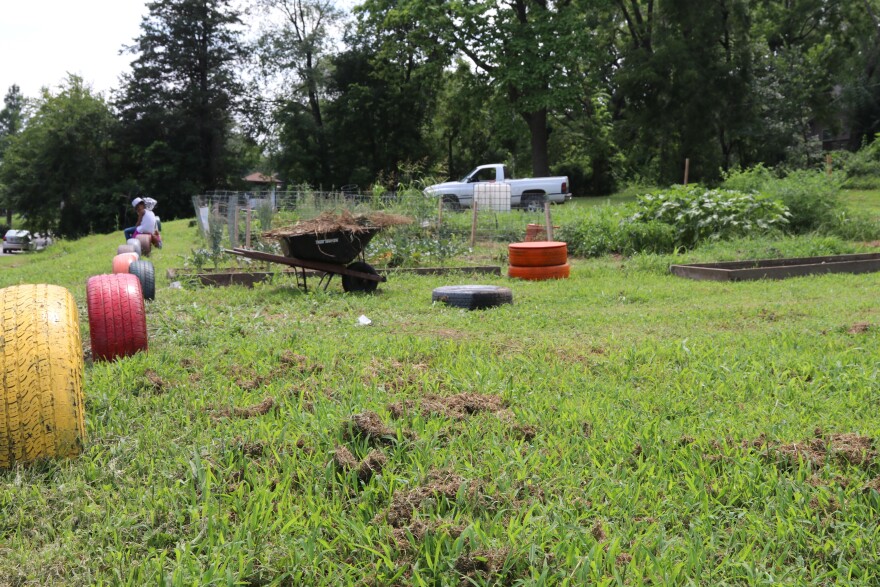It's a sticky summer afternoon in Kansas City, Kansas and Richard Mabion is outside replacing neighbor’s light bulbs for free. These bulbs will last longer and shine brighter, but most importantly, they’ll be much better for the environment.
“Those look like they might be 75 watt bulbs, maybe even higher, so it uses up 75 watts of energy,” Mabion says. “I’m going to put one out back here and this one’s only going to use nine watts.”

But where does pollution rank in his community's priorities?
“Net zero,” he says. “I don’t think it has much weighting at all."
Not even recycling?
“Nope, not even recycling,” he says. “They don’t recycle.”
Curbside recycling is available in KCK, but Mabion says many residents are unaware of the program or think its a way for the government to make money off of them.
Mabion is doing his part to change that. He is the president of the Kansas City, Kansas NAACP and the first African-American board member of the Kansas Sierra Club.
Mabion’s position is a unique one because the environmental movement has long been operating without much diversity - a fault that keeps many minority communities in the dark.
“It's all about education," Mabion says.
But this lack of environmental awareness in neighborhoods like Quindaro doesn’t just hurt the environment. Nearby pollution can hurt residents health.
In May 2014, the Environmental Justice and Health Alliance for Chemical Policy Reform released a study of 3,433 facilities nationwide using hazardous chemicals and shows more 134 million people in danger zones - the large majority of them being near predominantly black and Latino neighborhoods.
In Jackson county, the group identified four of these facilities and in Wyandotte county, five.
A year before, Mabion came across a similar situation. With the Sierra Club, he threatened to sue the Board of Public Utilities over two coal-fired power plants that suffocated black and Latino neighborhoods with smog in Wyandotte county.
The Sierra club pointed to a study by an environmental group that documented asthma and other health effects from the coal plans, primarily affecting black and Latino communities.
Although the BPU argued that the power plants didn't break any laws, the utility agreed to stop burning coal at one power plant and put in emissions controls at the other.
“I always say that the children of Quindaro will no longer have to deal with coal, which causes asthma and all the health problems,” Mabion says.
Despite the changes, many community members didn’t know about the pollution in first place.
“I became aware later on,” Aaron Marks says. “But at the time, I was not aware.”
Marks and his cousin, Terrell Dyer, began Project Rally, which stands for ‘Respect, Accountability, Love, Leadership and Youth.’
The co-founders have hosted community events like police ride-alongs and neighborhood brunches - all to redirect attention away from the negative.
“There were murders, no jobs, poverty, the list goes on - education - on, and on and on,” Dyer says. “But no one was out here saying, ‘OK, but what are we going to do about it?’”
Dyer and Marks turned their attention to trash, pointing out their communities faults when it comes to the environment.
“What about all this trash on the floor?” Dyer asks. “We’re mistreating ourselves around here and apparently y’all are cool with that. If you really want to show that you care about you, let's start picking this trash up.”

The duo brainstormed a project that could intersect environmental awareness with another local issue - healthy eating, which Dyer says is hard enough on its own.
“Especially when we see that we have no power over our produce because our grocery store up and moved,” he says. “That’s the thing - nobody really owns anything around here, especially their food source.”
With Mabion’s help, they planted a community garden on an empty plot of land along Alden Street. The vines of melons, stocks of peppers and rows of okra are bordered with a row of colorfully painted tires, donated by University of Kansas art students.
But the area remains open. Neighbors are free to take whatever fruits and vegetables they need. The green tomatoes, a local favorite, have been thoroughly picked over.
But the community garden provides more than just produce. It provides space to educate the community about other environmental issues. The latest concern - an attempt to move a truck stop into the neighborhood.
“Say hey y’all this is what we’re doing,” Dyer says. “This is what’s happening. We’re not going to leave it to anybody else. No, we’re going to gather. We’re going to feed each other. We're going to sit down. We going to talk about what’s happening. Then everybody's going to know more.”
The patch of plants is flourishing, but it only takes up a fraction of the open space. The duo has a vision for an expansion that could function year round. They certainly have room for it.
As for their next project, neither cousin knows what’s next. Mabion, for one, would love for the men to spread recycling awareness. But for now, they will keep neighbors informed and eating healthy foods.
As for Mabion, he'll continue reminding residents that helping the environment is as easy as switching out a light bulb.
Lexi Churchill is a news intern at KCUR. You can reach her at lexikchurchill@gmail.com or on Twitter @LChurchilll.




